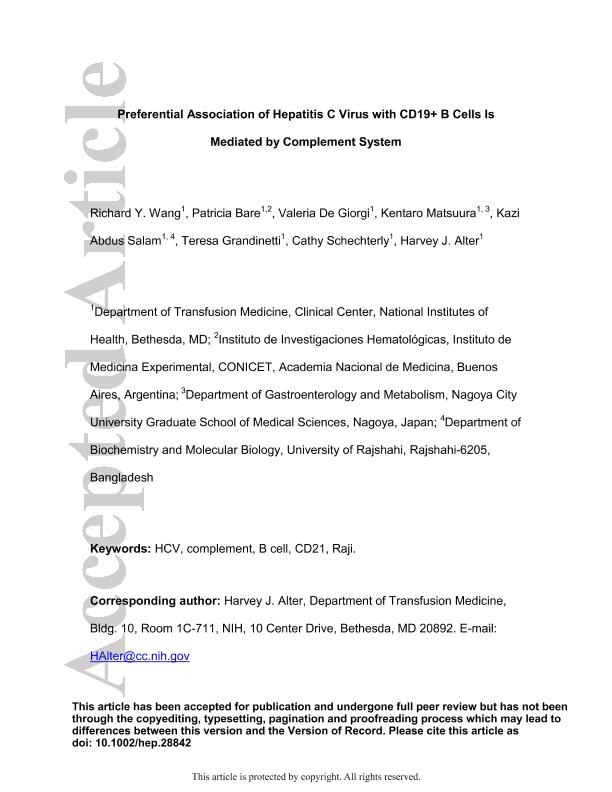Artículo
Preferential association of hepatitis C virus with CD19+ B cells is mediated by complement system
Wang, Richard; Baré, Patricia ; De Giorgi, Valeria; Matsuura, Kentaro; Salam, Kazi Abdus; Grandinetti, Teresa; Schechterly, Cathy; Alter, Harvey J.
; De Giorgi, Valeria; Matsuura, Kentaro; Salam, Kazi Abdus; Grandinetti, Teresa; Schechterly, Cathy; Alter, Harvey J.
 ; De Giorgi, Valeria; Matsuura, Kentaro; Salam, Kazi Abdus; Grandinetti, Teresa; Schechterly, Cathy; Alter, Harvey J.
; De Giorgi, Valeria; Matsuura, Kentaro; Salam, Kazi Abdus; Grandinetti, Teresa; Schechterly, Cathy; Alter, Harvey J.
Fecha de publicación:
19/09/2016
Editorial:
Wiley-liss, Div John Wiley & Sons Inc
Revista:
Hepatology
ISSN:
0270-9139
e-ISSN:
1527-3350
Idioma:
Inglés
Tipo de recurso:
Artículo publicado
Clasificación temática:
Resumen
Extrahepatic disease manifestations are common in chronic hepatitis C virus (HCV) infection. The mechanism of HCV-related lymphoproliferative disorders is not fully understood. Recent studies have found that HCV in peripheral blood mononuclear cells (PBMCs) from chronically infected patients is mainly associated with CD19+ B cells. To further elucidate this preferential association of HCV with B cells, we used in vitro cultured virus and uninfected PBMCs from healthy blood donors to investigate the necessary serum components that activate the binding of HCV to B cells. First, we found that the active serum components were present not only in HCV carriers, but also in HCV recovered patients and HCV negative healthy blood donors and that the serum components were heat labile. Second, the preferential binding activity of HCV to B cells could be blocked by anti-complement C3 antibodies. In experiments with complement-depleted serum and purified complement proteins, we demonstrated that complement proteins C1, C2, and C3 were required to activate such binding activity. Complement protein C4 was partially involved in this process. Third, using antibodies against cell surface markers, we showed that the binding complex mainly involved CD21 (complement receptor 2), CD19, CD20, and CD81; CD35 (complement receptor 1) was involved but had lower binding activity. Fourth, both anti-CD21 and anti-CD35 antibodies could block the binding of patient-derived HCV to B cells. Fifth, complement also mediated HCV binding to Raji cells, a cultured B cell line derived from Burkitt´s lymphoma.CONCLUSION:In chronic HCV infection, the preferential association of HCV with B cells is mediated by the complement system, mainly through complement receptor 2 (CD21), in conjunction with the CD19 and CD81 complex. This article is protected by copyright. All rights reserved.
Palabras clave:
Hepatitis C
,
Leucocytes
,
B-Limphocytes
,
Cd19
,
Hepacivirus
Archivos asociados
Licencia
Identificadores
Colecciones
Articulos(IMEX)
Articulos de INST.DE MEDICINA EXPERIMENTAL
Articulos de INST.DE MEDICINA EXPERIMENTAL
Citación
Wang, Richard; Baré, Patricia; De Giorgi, Valeria; Matsuura, Kentaro; Salam, Kazi Abdus; et al.; Preferential association of hepatitis C virus with CD19+ B cells is mediated by complement system; Wiley-liss, Div John Wiley & Sons Inc; Hepatology; 64; 6; 19-9-2016; 1900-1910
Compartir
Altmétricas



